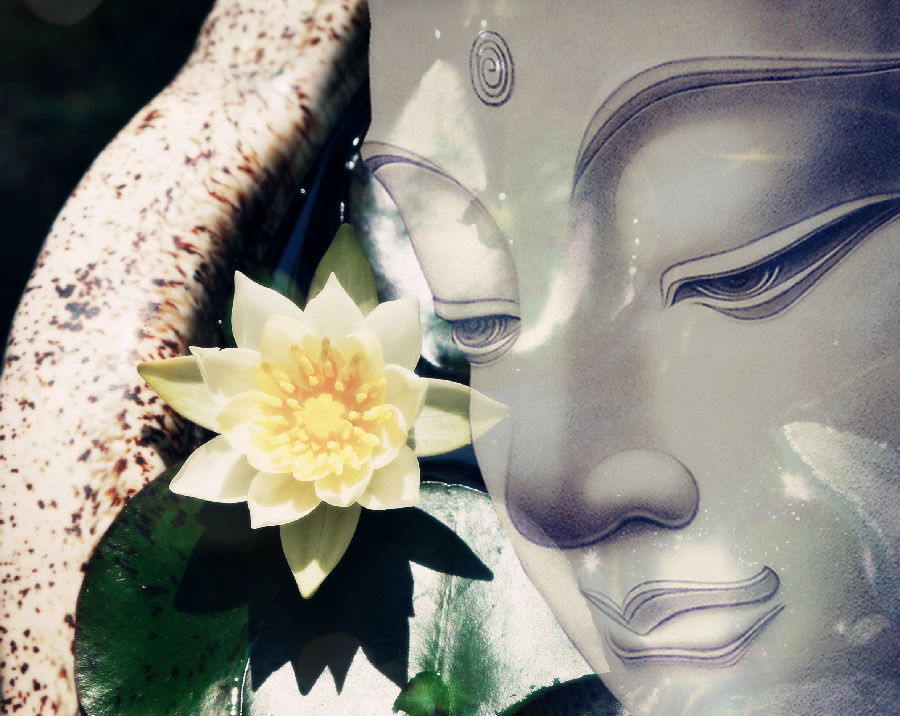Like so much in Buddhism, Nirvana clearly has to be experienced, not explained.
就像佛教中的許多概念,很明顯涅槃是要修行,而非口頭上的解釋。
But for Buddhists, the journey to get there, the path you take, seems to be as important as the arriving.
但對佛教徒而言,這條通往涅槃之路和到達目的地同等重要。
Buddhists will tell you that Nirvana has no fixed point in time or space.
佛教徒會告訴你,涅槃并非特定的時間或空間。
And that's actually a little ironic, because one of the few accepted fixtures of the Buddhist story is where the Buddha himself found enlightenment.
這有點諷刺,因為在少數被廣泛接受而又非常確定的佛教故事中,其中一個就是佛陀開悟的地點。

We're told that that took place in Northern India under the spreading branches of a peepul tree.
我們知道那是在印度北部一棵枝繁葉茂的菩提樹樹蔭下。
Which is where my quest had started, at Bodhgaya, at this spot where it's said Buddhist philosophy really began 2,500 years ago.
就是我這次旅程的起點,菩提伽耶。那里就是2500多年前佛教的發源地。
In this journey I have explored key facets of Buddhist belief and got a little closer to understanding something vital about the core of Buddhist philosophy, the Dharma.
在這趟旅程中,我探究了佛教信仰的主要方面,并近距離了解佛教哲學核心概念“法”的重要意義。
The Dharma is simply the way the world is.
法就是世界存在的方式。
And we can all best live our lives if we follow a path that allows us to deal with the world as passionately, as compassionately, as positively and as wisely as possible.
如果遵循這條路,盡可能胸懷慈悲,并積極明智地生活,所有人都會得到最好的人生。
Now, whatever the permutations and interpretations of Buddhism, that seems to me to be pretty simple and pretty enlightened.
現在,無論別人如何解釋佛教,在我看來卻是相當簡單明了。
I've learnt about Karma, how mindful actions impact on our lives, about Samsara,
我了解到因果報應,銘記行為會如何影響自己的生活。
the cycle of life, birth and death, about meditation, about Zen, and the final goal for all Buddhists, Nirvana.
了解到輪回,生命的循環,生生死死。了解到冥想和禪,以及所有佛教徒的終極目標——涅槃。
I have seen some of the most beautiful architecture inspired by Buddhist ideas.
我看到了受到佛教思想啟發的優美建筑。
And how, after 25 centuries, Buddhism still attracts millions across the globe.
看到了在25個世紀之后佛教依然吸引著全球數以百萬計的信眾。
A philosophy that is rooted in its ancient past and yet gives character to the modern world.
看到了這門根植于古老過去的哲學,仍將其特質賦予現代社會。
How Buddhism places the responsibility to realise the truth on all of us.
看到了佛教是如何讓我們所有人擔荷起發現真理的重任。
As Buddhism travelled, it transformed the cultures it came into contact with, just as it too was transformed.
佛教在傳播途中,改變了與之接觸的文明同時,自身也發生了變化。
You wonder if Buddha could ever possibly have imagined the impact that his ideas would have on human history.
不知佛陀是否曾經想過他的思想對人類歷史所產生的影響。
Particularly given the one thing he was certain about, was that impermanence and change were the only things that were definite in this world.
特別是他非常確定的那件事,無常變化,是這個世界唯一不變的東西。
Just listen to this - it's one of his most poetic epithets.
來聽聽這段偈頌吧——非常有詩意。
So shall you think of all this fleeting world.
所以你認為所有這些短暫的世界。
A star at dawn, a bubble in a stream.
一切有為法,如夢幻泡影。
A flash of lightning in a summer cloud.
如露亦如電,應作如是觀。
A flickering lamp, a phantom, and a dream.
一個閃爍的燈,一個幽靈,一個夢想。
Well, the Buddha's dreams of 2,500 years ago are still with us.
佛陀在2500年前的夢想依然與我們同在。
And they've been made incarnate in one of the most tenacious belief systems of all time and in some of the most iconic and beautiful monuments in the world.
它化身為歷史上最為頑強的信仰體系之一,和一些世界上最具標志性的優美建筑。











